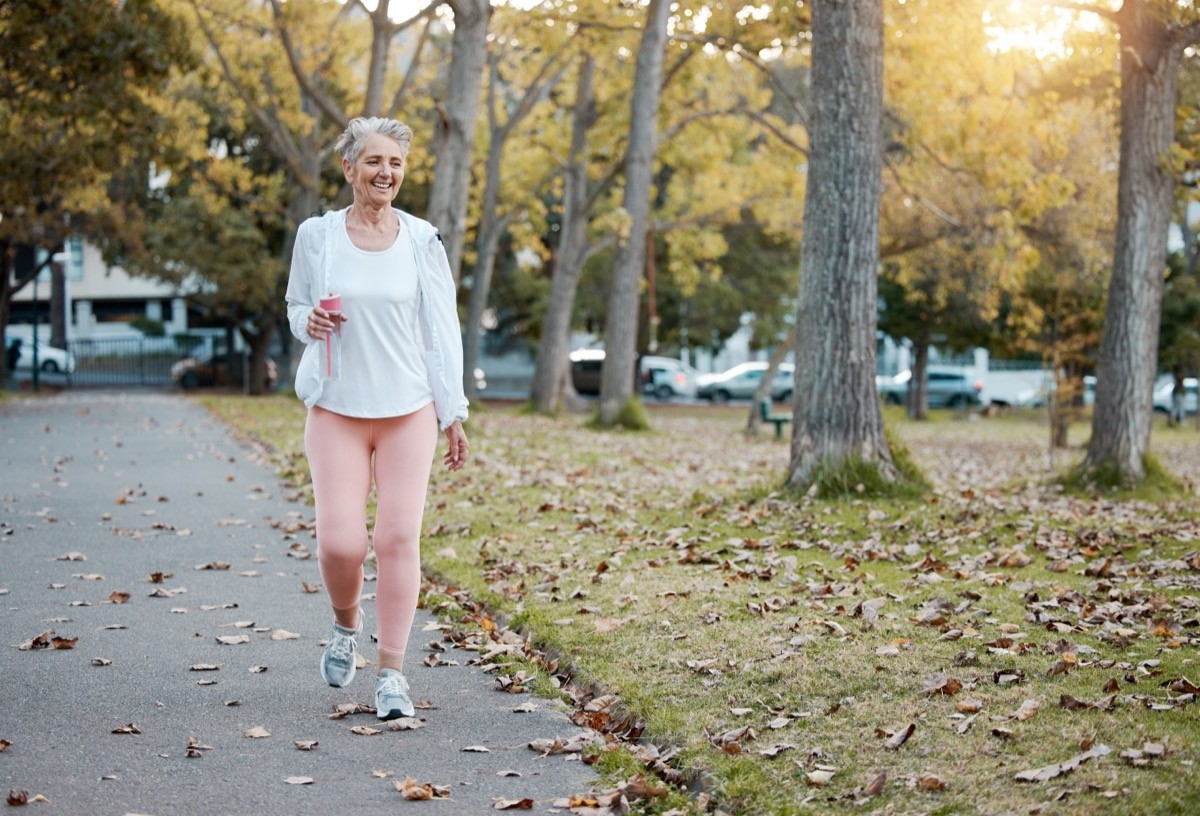I’m a Cardiology Nurse Practitioner—Do These 5 Things Every Time You Walk for a Healthier Heart

Did you know that walking could be your best tool for heart health? The American Heart Association recommends 150 minutes of moderate aerobic activity each week, and walking is one of the easiest and most effective ways to hit that goal. It’s simple, accessible, and powerful. Don’t underestimate it—walking at a comfortable pace, where you can still hold a conversation, offers numerous health benefits.
As a cardiology nurse practitioner and health & wellness coach, I’ve dedicated my career to preventing, treating, and reversing heart disease. And when it comes to boosting your heart health, walking is by far the #1 thing you can do. Here, I’ll share five effective habits that can help you make the most of your daily walks and improve your overall health.
RELATED: 26 Health Benefits of Walking.
How Walking Improves Heart Function

From a physiological standpoint, you can see an improvement in stroke volume, which results in improved heart function. This is why you often hear people associate athletes with a “low heart rate.” The heart’s muscle is conditioned to pump more effectively (stroke volume), so it doesn’t need as high of a heart rate to reach the same cardiac output (the amount of blood the heart can pump with each heartbeat). So, the basic formula is: aerobic activity (e.g., walking) → improved stroke volume → improved heart function → reduction in heart rate.
Benefits for Cardiovascular Diseases

We also see improvement in many cardiovascular diseases such as high blood pressure, high cholesterol, neurocardiogenic disorders like POTS (postural orthostatic tachycardia syndrome), peripheral arterial disease, and coronary artery disease. Often, the amount of medication required to treat these diseases can be significantly reduced by consistently incorporating walking into your daily routine.
Other Health Benefits of Walking

I can’t let an article about walking slip by without mentioning a few other health benefits, including improved respiratory function, weight reduction, improved endurance, enhanced mood, and increased energy.
Start Slow, Build Gradually

Just like with any physical activity, it’s important to start slow and build gradually. For some people, this may initially look like walking to the mailbox every day. But I can guarantee you that if you commit to walking every day, you will be able to increase your distance and endurance in a matter of weeks! Consistency is the goal here.
RELATED: The 7 Best Walking Shoe Brands.
Five Effective Habits to Boost Walking

Below are five effective habits to boost walking that I implement into my daily life and encourage my patients and clients to do as well.
- Take an evening walk. This is a two-for-one benefit! Not only are you getting aerobic activity into your day, but you are also reducing a blood sugar spike after your evening meal.
- Park in the farthest parking spot. Always park furthest away from your destination when parking in a parking lot. These few extra steps really add up!
- Take the stairs. Take the road less traveled. I encourage you, the next time you are about to get on an elevator or escalator, to remember this article and go find the stairs. Trust me, you’ll be proud of yourself for this simple accomplishment!
- Go shopping. Walking adds up quickly during retail therapy. You’re basically being prescribed to go shopping for your heart health. Now if this isn’t girl math, I don’t know what is!
- Find a hobby that includes walking. For me, it’s hiking. I combine it with my love for travel. My most recent trek was the Tour du Mont Blanc in Europe, where I completed a total of 130 miles in 10 days. For some, that may be a little too extreme, but find something you enjoy that also keeps that aerobic activity up.
Be Mindful of Your Steps

An important habit to develop is health awareness. Be mindful of how much you walk in a day. Wearable devices have become popular over the past several years, and while they have their flaws and are not the most accurate, they do provide quantifiable data that can be tracked over time. In my opinion, the trends in the amount of walking per day are valuable. Regardless of how many steps you take in a day, you should challenge yourself to increase that amount over time to optimize your cardiovascular health.